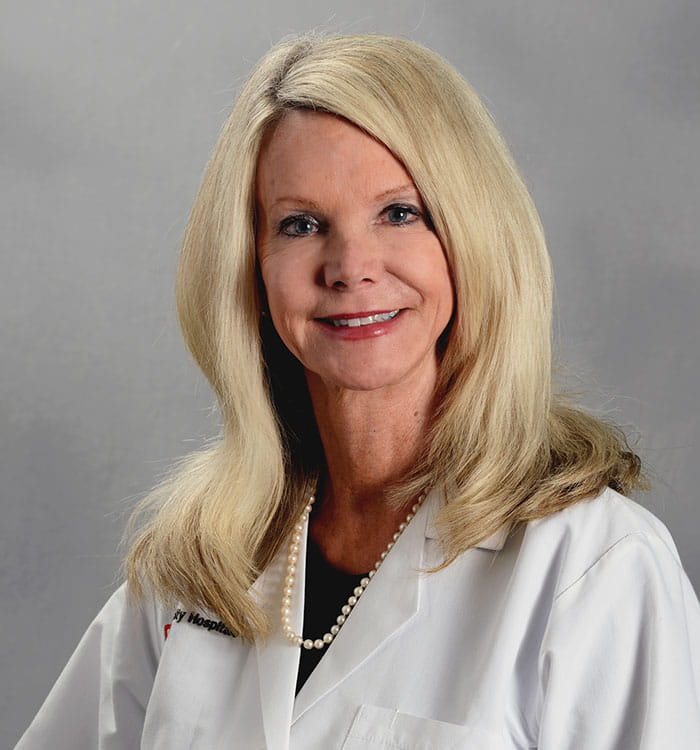Finding System Solutions to Better Deliver Care
June 27, 2021
“Dinner with the Doc” winner and UH neurologist Debbie Ewing-Wilson, DO, is dedicated to the details
UH Clinical Update | June 2021
 Deborah Ewing-Wilson, DO
Deborah Ewing-Wilson, DOWhat’s the best way to harness the vast clinical expertise in a large health system like UH, delivering care in a way that’s efficient, integrated and seamless for both patients and providers? That’s the issue that animates UH neurologist Debbie Ewing-Wilson, DO, every day. As Vice Chair of Operations for Neurology, she is laser-focused on achieving a more integrated clinical delivery system – a goal she first set for herself when she joined UH six years ago after a 27-year career at Kaiser Permanente.
What I really enjoy about University Hospitals is the commitment to improve the health of our patients, drive high-quality care and maximize the integrated delivery system,” she says. “There’s no reason with the current care landscape that we have at UH to go outside of our system. We can provide everything, from primary, to specialty, to subspecialty, to tertiary and quaternary care.”
To provide greater integration across the UH system, one area of focus for Dr. Ewing-Wilson has been to develop a system-wide approach to sleep medicine services, along with Nicole Maronian, MD, Chair of ENT. This involved calling on the talents of physicians boarded in sleep medicine from ENT, neurology, pulmonology and psychiatry and deploying them in a more efficient way.
“We’re lucky in that we have all of these specialties available to us at UH, but we never had a way of comprehensively joining them,” she says. “So we created a committee with a number of us on it as a means of oversight to look at how best to deliver comprehensive sleep medicine services to our patient population and to integrate the community sleep docs with our colleagues at main campus.”
The system-wide sleep medicine initiative also involved developing a more comprehensive approach to the nine UH sleep labs located across the UH system, Dr. Ewing-Wilson says, as well as a system solution for hardware so that sleep providers can read and interpret sleep studies, no matter where they are in the UH system. Telemedicine has also played a large role.
”We’re looking at leveraging our technology through telemedicine to reach diverse geographic locations,” she says. “We have the infrastructure to deliver on this, and we have. Our physicians now work collaboratively together with the sleep techs, with our patients. We are utilizing each other’s areas of expertise from cognitive behavioral therapy in psychiatry for insomnia to innovative surgical solutions in ENT through Inspire therapy for sleep apnea. We’re looking at how to harness the energy of what’s going on in different areas and then bringing it together in a collaborative, centralized approach.”
Dr. Ewing-Wilson was recently honored for this work with a “Dinner with the Doc” award from UH CEO Cliff Megerian, MD. The award also recognized Dr. Ewing-Wilson’s efforts to improve stroke call coverage across the UH system, decrease wait times for Neurology appointments and plan for recruitment and retirements in the department.
On the stroke call issue, Dr. Ewing-Wilson worked with UH hospital presidents as key stakeholders. She made the case that providing high-quality, consistent standards of care across the entire UH system required stipends and call pay for stroke services at each hospital that are benchmarked and equitable. By giving hospital presidents time to build these benchmarked figures into their budgets, she got buy-in.
One side result of these efforts: More neurologists maintaining privileges at more UH community hospitals, resulting in better coverage.
“Instead of having gaps in coverage, which was typical, it allowed us to fill all of those gaps,” Dr. Ewing-Wilson says. “Now we have very, very few days that go uncovered that require the Transfer Center.”
Dr. Ewing-Wilson has also worked in creative ways to increase access to UH neurologists for patients, helping to decrease days to first appointment from 45 to 19. She helped redesign templates and schedules to include more appointments for new patients and fewer follow-up appointments.
“Dr. Megerian’s direction was that we wanted to take new patients, all comers, we wanted to build our program,” she says. “That’s not going to go well if you have nothing but follow-ups in your schedule. It’s important to provide the follow-ups, but we need a certain number of new patients.”
Relying more on APPs and embracing teleneurology for patients in more remote locations have also made a difference in neurology access, Dr. Ewing-Wilson says.
“Our NPs and our PAs have been able to provide some of that follow-up care so our specialists and subspecialists were really available to treat those complex new patients,” she says. “It was trying to get everyone to practice up to the scope of their license, if you will. Maybe one good result of the pandemic is that we’ve learned to work better together as a team and we’ve leveraged our teleneurology to a great extent. We now have patients in Youngstown and other areas. Seizure patients who may not be able to drive, patients with disabilities that prevent them from driving and patients in remote or low-income areas may have challenges with transportation. Teleneurology allows them to be seen in a timely manner.”
After nearly 40 years as a physician, Dr. Ewing-Wilson says she still enjoys the one-on-one contact with patients, hearing about their circumstances and devising a plan to address them.
”It’s much more shared decision-making,” she says. “You really need to involve them, and I enjoy doing that, hearing about the challenges, the obstacles, as well as the successes.”
However, she says she also is looking forward to taking on more challenges in helping UH operate even more like one, unified health care system.
“This has truly been the best career decision of my life, coming to UH,” she says. “The work continues.


